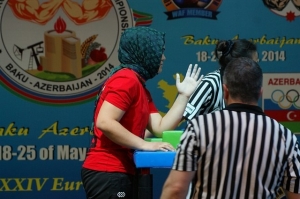In the first part of this article we wrote on what do people like to train in. Today we’ll address the issue of what do people wear when they compete.
Large events like the European and World Championships have a dress code. A1 and Nemiroff have the official mandatory t-shirts. At the Europeans and Worlds’, the teams have their officially accepted garments. But the things that happen at local events, they are the real issue. The rules recommend sports shoes, sweats and t-shirts. But people often approach the table in garments far from befitting a sports event. Shorts, boots, jeans, flip-flops, cardigans – that’s just not sportswear, at all. Even referees come to tournaments dressed improperly. Why is this acceptable? Even federations often don’t see this as a problem, so there is no one to fight this.
Footballers go out to the field only in proper garments. That is mandatory. The rules are strict, there’s no place for improvising. The referees also have to wear what the rules tell them to. Other sports have such rules too, like boxing, hockey, etc. In armwrestling everything is askew. How do we change that? We’ve asked the RAA PR official, Ivan Dobrorezov.
Unfortunately, the WAF rules and regulations don’t address this matter exactly. The “dress” paragraph tells us that all contestants and officials should adhere to the official WAF dress code. T-shirts or tank-tops, sports pants (not jeans); sports shoes. That’s it. There is no exact requirements as to how a t-shirt should look. “Sports pants” is also a wide definition. That can mean tight leggings, sweatpants, or colorful extreme sports garments. RAA has more strict rules. An exempt: “To participate in a fight, a contestant should be dressed in a sports attire: an RAA top, sports pants (no shorts allowed) and sports shoes. RAA tops are T-shirts used in A-1, and Russian national team T-shirts. Arms have to be exposed, as do hands.
It is forbidden to use hand wraps, or any wrist or elbow stabilizers. No rings are allowed on fingers. If a ring cannot be removed, the referee asks the other opponent if they are OK with that. If they are, the fight can go on, if not – that means an automatic loss for the person with the ring.
Hands need to be clean, with no skin diseases, nails need to be cut short. Magnesium is allowed. Any baseball caps need to be removed or turned backwards. Caps are actually banned now, but the rule hasn’t been written yet. The thickness of the soles of shoes has not been regulated. Contestants are allowed to use a platform. Chewing gum is not allowed. Long hair needs to be tied back. At the Russian championships, each team should have its own unified outfit, with name of city or region printed in a visible place.
Another point of conflict is religious wear. Indeed, rules should allow for religious matters, so as not to sentence anyone to a choice between sports and religion. Unfortunately, neither WAF nor RAA regulate religious matters – says Ivan Dobrorezov. – I think it’s necessary. If a man or a woman cannot bare their heads for religious reasons, we should make the rules more adapted to such matters. Another thing – the elbow warmer. A fighter should not approach the tale with the warmer still on his free arm.

It seems a simple enough issue, but only at first sight. Some of the problems need to be addressed, by instituting new rules. But until everyone adheres to the same rules, armwrestling will forever look like a circus show, not a sports event.
Artur Grigorian

